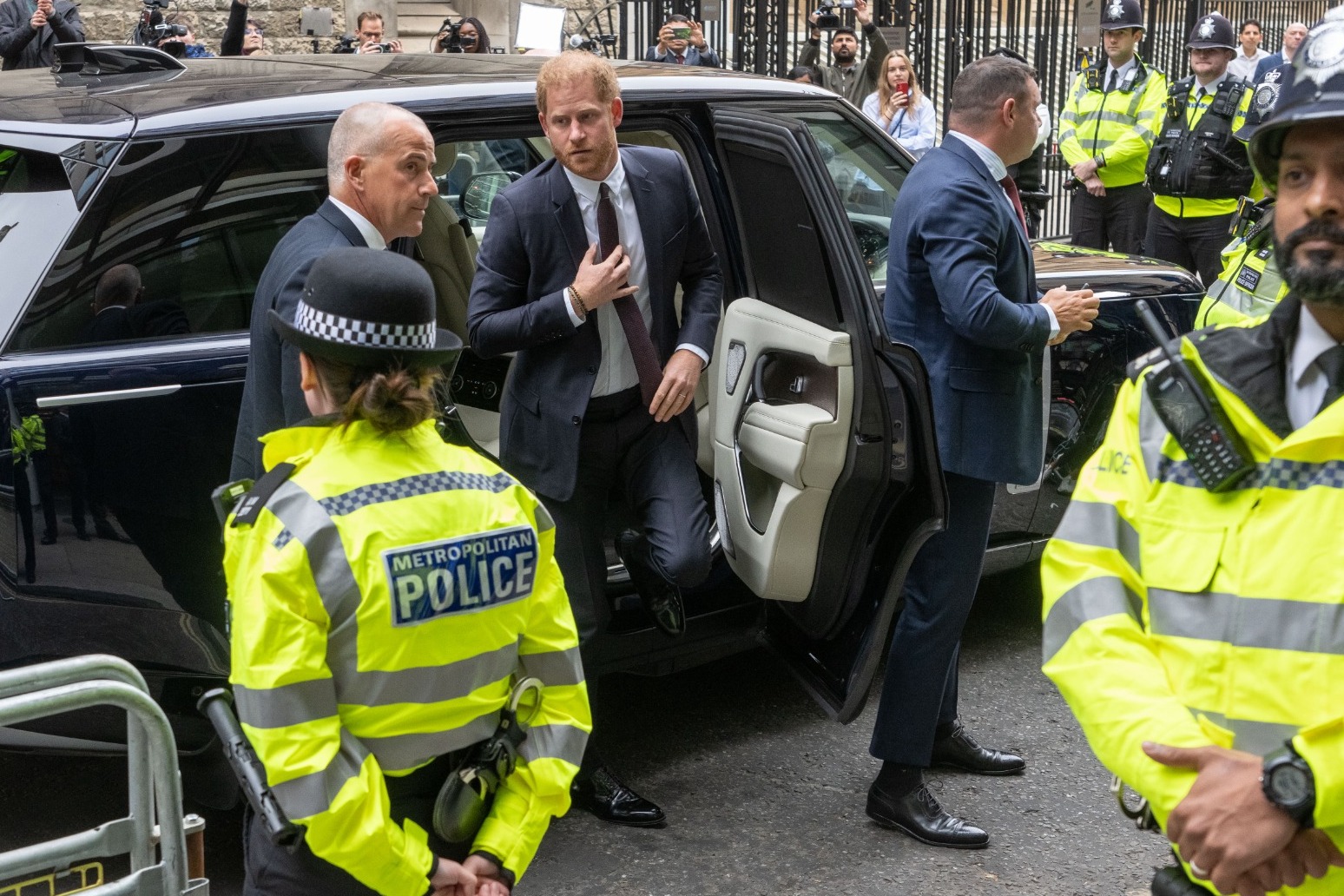
Duke of Sussex arrives at High Court to give evidence in hacking trial
The Duke of Sussex has arrived at the High Court in London to give evidence in his claim against the publisher of the Mirror over alleged unlawful information-gathering.
Harry is suing Mirror Group Newspapers (MGN) for damages, claiming journalists at its titles, which also include the Sunday Mirror and Sunday People, were linked to methods including phone hacking, so-called “blagging” or gaining information by deception, and use of private investigators for unlawful activities.
The 38-year-old’s claim is being heard alongside three other “representative” claims during a trial which began last month and is due to last six to seven weeks.
The duke arrived on Tuesday at the Rolls Building, which was surrounded by journalists and a heavy police presence.
He had been expected to attend court on Monday but his lawyers said he would not appear until Tuesday, when he is due to face cross-examination from MGN’s barrister.
David Sherborne, representing the duke and the other claimants, said as the hearing began on Monday that Harry had flown to the UK from Los Angeles in the US on Sunday night, after celebrating his daughter Lilibet’s second birthday.
Mr Justice Fancourt, the judge hearing the case, said he was “a little surprised” to hear that the duke would not be attending court on Monday.
The judge said he gave a direction earlier in the trial that witnesses should be available the day before their evidence was due to be heard in case the legal teams’ opening speeches ran short.
Mr Sherborne told the court on Monday that the duke was subjected to unlawful information-gathering activity “right from when he was a young boy at school” into adulthood, adding: “Nothing was sacrosanct or out of bounds.”
He continued: “Every part of the prince’s life during these years was invaded by these three papers using these unlawful methods.”
The barrister said that, contrary to some criticism of Harry, it was “the use of these methods by a national media group that has brought him here, not some vendetta against the press generally”.
Harry alleges that about 140 articles published between 1996 and 2010 contained information gathered using unlawful methods, and 33 of these have been selected to be considered at the trial.
Mr Sherborne said the 147 articles in Harry’s claim are a “fraction” of all the articles written about the duke’s private life during that time, adding that MGN disclosed “almost 2,500” articles published about him throughout that period.
He said MGN had a “huge interest” in the royal family, the duke in particular, and “every aspect of his private life”.
The barrister later described Harry as “one of the most written-about individuals in those newspapers” for several years.
MGN is contesting the claims and has either denied or not admitted each of them.
The publisher also argues that some of the claimants have brought their legal action too late.
Harry’s court appearance will come just over a month after he attended the coronation of his father, the King.
It is thought to be the first time a senior member of the royal family has personally appeared in court proceedings since 2002, when the Princess Royal pleaded guilty to a charge under the Dangerous Dogs Act after her pet bit two children in Windsor Great Park.
On the first day of the trial, lawyers for MGN said the publisher “unreservedly apologises” to the duke for one instance of unlawful information-gathering and that it accepts he is entitled to “appropriate compensation”.
Andrew Green KC said it is admitted that a private investigator was instructed, by an MGN journalist at The People, to unlawfully gather information about Harry’s activities at the Chinawhite nightclub one night in February 2004.
“Otherwise, the specified allegations are denied, or in a few cases not admitted,” he added.
The three other representative claimants are Coronation Street actor Michael Turner, known professionally as Michael Le Vell, who is best known for playing Kevin Webster in the long-running soap, former Coronation Street actress Nikki Sanderson, and comedian Paul Whitehouse’s ex-wife Fiona Wightman.
Mr Green said at the outset of the trial that voicemail interception is denied in all four cases and that there is “no evidence or no sufficient evidence”.
The barrister continued: “There is some evidence of the instruction of third parties to engage in other types of unlawful information-gathering in respect of each of the claimants, save for Mr Turner whose claim is entirely denied, and MGN has made pleaded admissions in respect thereof.
“MGN unreservedly apologises for all such instances of unlawful information-gathering, and assures the claimants that such conduct will never be repeated.”
At the start of the trial in May, an MGN spokesman said: “Where historical wrongdoing has taken place we have made admissions, take full responsibility and apologise unreservedly, but we will vigorously defend against allegations of wrongdoing where our journalists acted lawfully.”
MGN has previously settled a number of claims against it in relation to unlawful information-gathering, but a 2015 trial of representative claims, including those brought by former Coronation Street actress Shobna Gulati, ex-footballer Paul Gascoigne and actress Sadie Frost, is the only other trial to have taken place during the long-running litigation.
Published: by Radio NewsHub